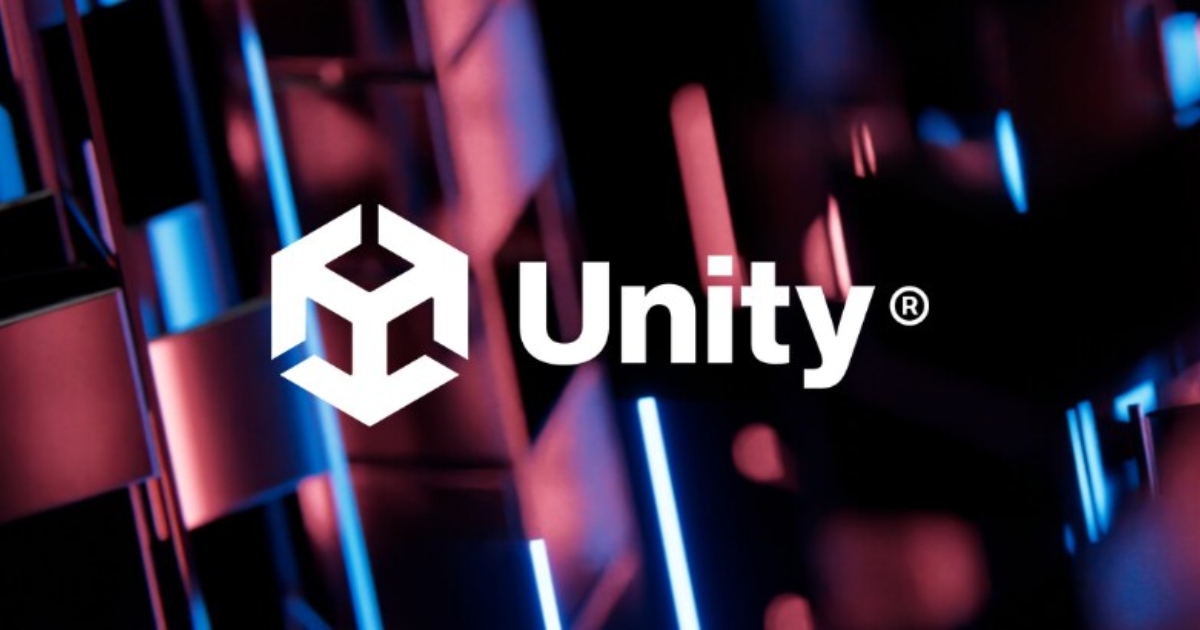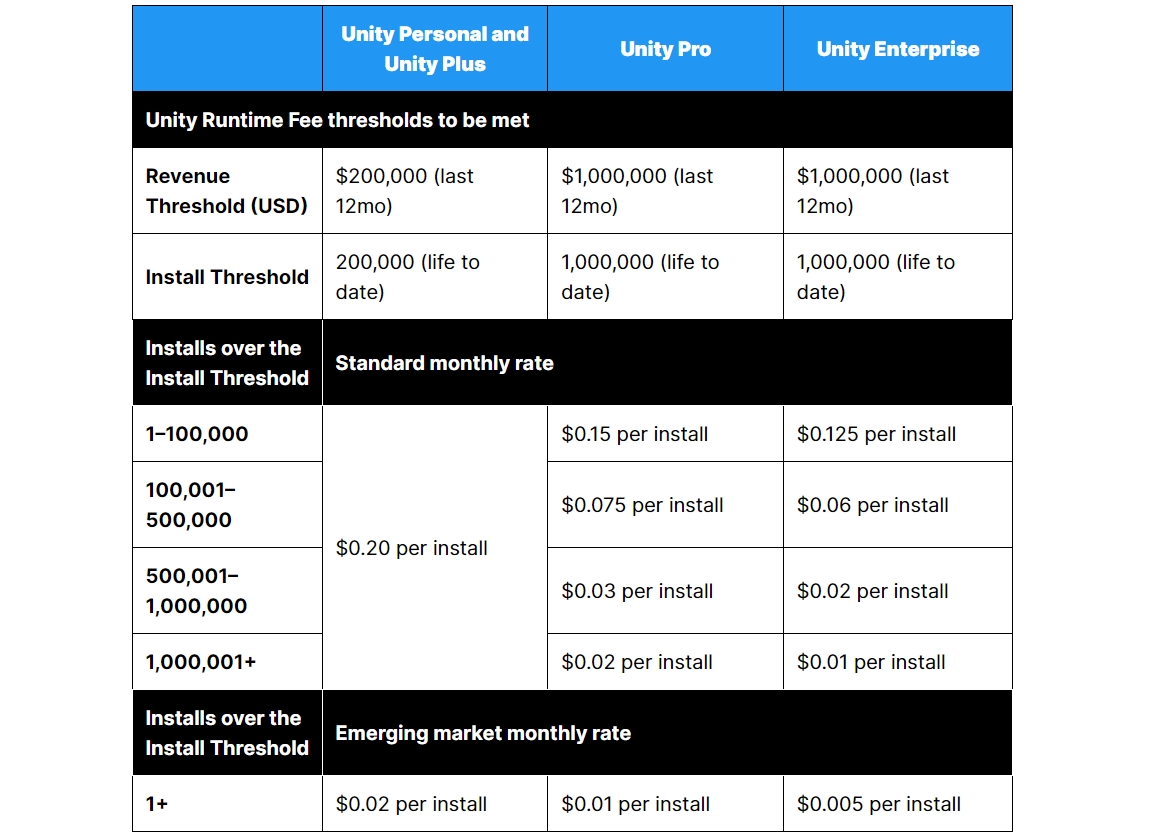Unity has announced an update to its pricing policy, Here is a breakdown of all the changes, including the biggest one — the so-called “Runtime Fee” charged for every install after a game crosses certain thresholds.

UPDATE: The article has been updated to add Unity’s official comment and new details about how the company will count unique installs.
Will Unity now charge developers for every install of their games?
On September 12, Unity detailed changes to its plans and prices in a blog post, introducing a new Runtime Fee model based on the number of users installing games built with the engine.
The changes will take effect on January 1, 2024.
The Runtime Fee is applied if a certain product meets two criteria: a minimum revenue threshold in the last 12 months and a minimum lifetime install count. Fees depend on the type of Unity plan the developer is using:
- Unity Personal and Unity Plus — $200k in 12-month revenue and 200k lifetime installs (for each game, not for the entire portfolio);
- Unity Pro and Unity Enterprise — $1 million in revenue and 1 million installs.
Fees will be charged monthly, and their amount per install will vary depending on the license. The changes will most affect devs using the Unity Personal and Plus plans, as they will have to pay $0.20 for every install above the 200k threshold.
Pro and Enterprise subscribers will be charged smaller fees. For example, devs using Unity Pro will start at $0.15 for every install above the 1 million threshold, gradually going down to as low as $0.02. And the Runtime Fee for Unity Enterprise users will scale down from $0.125 to $0.01.
Unity will also reduce fees for developers operating their games in emerging markets like India: $0.02 (Unity Personal and Plus), $0.01 (Unity Pro), and $0.005 (Unity Enterprise).
The full breakdown of the fee structure can be seen below.

It is worth noting that Unity won’t charge for older installs that occurred before January 1, 2024.
On top of that, the company will offer “credits” (discounts on standard fees) to developers of free-to-play games if they use other Unity services beyond the Editor, such as Unity Gaming Services or LevelPlay (an ad mediation platform for mobile games).
Why is Unity introducing the Runtime Fee?
The company says its engine consists of two software products, the Unity Editor and the Unity Runtime. The latter is code that runs on player devices and helps developers scale their games. So it believes that it is reasonable to charge additional fees for the use of the Runtime.
“We chose this because each time a game is downloaded, the Unity Runtime is also installed,” the official explanation reads. “Also we believe that an initial install-based fee allows creators to keep the ongoing financial gains from player engagement, unlike a revenue share.”
In a separate FAQ, Unity noted that the Unity Runtime has billions of monthly downloads, so the company needs additional resources that will go “towards the continued investment in that code.”
Unity Create president Marc Whitten also told Game Developer that Unity is seeking to “better balance the value exchange” between Unity and developers. He added that a “large majority of Unity Editor customers are currently not paying and will NOT be impacted by this change.”
How will Unity count installs, and what about “install-bombing”?
Unity initially told Axios’ Stephen Totilo that it will charge fees even when a user installs a single game multiple times: “If a player deletes a game and re-installs it, that’s 2 installs, 2 charges. Same if they install on 2 devices.”
Many developers have already expressed concerns that the system seems vulnerable to abuse. “So I can technically run my competitors into the ground by having a farm of machines installing and uninstalling their games in an endless cycle?” Keepsake Games co-founder Filip Coulianos wrote, adding that “review bombing will get a whole new meaning.
Unity then shared a post on social media to “provide clarifying answers to the top questions most of you are asking.”
The company once again tried to reassure developers by saying that the changes would only affect a small portion of Unity customers: “Yes, this is a price increase and it will only affect a small subset of current Unity Editor users. Today, a large majority of Unity Editor users are currently not paying anything and will not be affected by this change.”
In a new post on its official forums, Unity also noted that developers “will need to pay for all future installs. The reason is that Unity doesn’t receive end-player information, just aggregate data.”
However, following a negative reaction from the community, a Unity spokesperson told Axios that the company had “regrouped” to discuss the issue. Here are the updated details on the Runtime Fee:
- Unity will only charge for an initial installation, so re-installs don’t count;
- Fees will be applied if the same user installs a game on a second device;
- Charity games will be free of charge;
- Per-install fees for games distributed via subscription services like Game Pass will be charged to distributors (say, Microsoft), not developers;
- Fees won’t be charged for installation of game demos unless they include the full game (as in the case of Early Access titles).
It is worth noting that information on Unity’s forums and its official website is still vague on how the company will define unique installs. “An install is defined as the installation and initialization of a project on an end user’s device,” the updated FAQ mentioned above now reads.
The company also pledged to defend developers from potential abuse of the system — e.g. the so-called “install-bombing”, when an angry user may keep re-installing a game to make a certain developer pay extra fees. But the exact mechanisms of this protection remain unclear.
“We do already have fraud detection practices in our Ads technology which is solving a similar problem, so we will leverage that know-how as a starting point,” the text reads. “We recognize that users will have concerns about this and we will make available a process for them to submit their concerns to our fraud compliance team.”
However, many questions remain unanswered. For example, if Microsoft is charged by Unity for above-the-threshold installs on Game Pass, how will that affect its deals with developers (especially indies)? Will the Runtime Fee be applied to pirated games? The company has yet to clarify many concerns raised by developers in recent hours.
How will the changes affect each Unity subscription plan?
In November, Unity will update all its subscription plans to “add extra value.” The pricing for Unity Pro and Unity Enterprise subscriptions will remain the same, but here are the main changes coming to other plans:
- Unity Personal — the plan will remain free, but starting this November, devs will have to sign in with their Unity ID and connect to the internet to use Unity (they will only be able to use Unity offline for up to three days);
- Unity Plus — it will no longer be available to new subscribers starting September 12 to “simplify the number of plans” the company offers (current users may upgrade to Unity Pro for the price of Plus for one year or renew their plan for an additional year until March 27, 2024).
To offset the introduction of the Runtime Fee and other changes, Unity will add new features to all of its plans:
- Unity Sentis — an AI solution introduced earlier this year, which integrates neural networks in the Runtime and allows developers to enhance gameplay and other elements of their games by running them on end-user devices using AI technologies;
- Unity Asset Manager — a cloud-based asset storage system, which will launch in November (storage size depends on the subscription plan);
- Unity DevOps — a workflow automation tool as part of Unity Gaming Services (the number of seats and storage size depend on the subscription plan);
- Team administration tools — embedded in the Unity Dashboard, these tools will launch in November and will provide role-based access into product usage and help admins keep the production process agile (role types depend on the subscription plan).
New changes come exactly one year after the last price increases
In September 2022, Unity announced its decision to raise prices for Unity Pro (from $1,800 to $2,040 a year) and Unity Enterptrise (from about $2,400 to $3,000 a year) plans.
Speaking about the reasons, the company said “the new price reflects the value of our products today, and it’s our first increase in almost three years.”
At the time, Unity also pledged to further improve the Editor by adding new rendering capabilities and increasing its R&D investments.
Although the company’s financials have improved in recent quarters (following its $4.4 billion merger with ironSource and the announcement of the upcoming AI solutions), it has already made two rounds of job cuts this year. Unity initially laid off 284 employees in January, followed by 600 people in May (the largest round in the past 12 months).
On top of that, the company hasn’t posted a single profitable quarter since going public, with its net loss still amounting to hundreds of millions of dollars.
